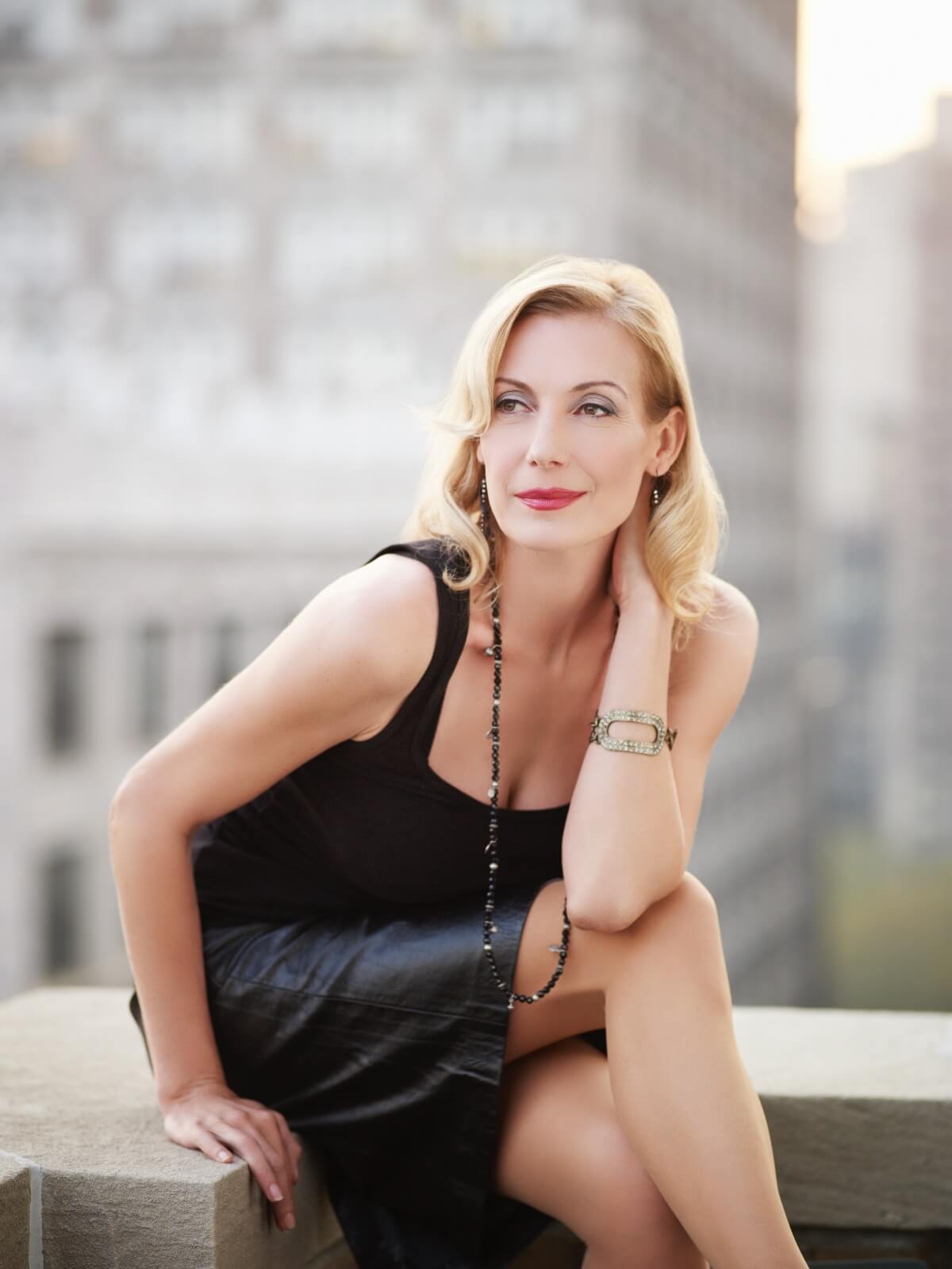
Iconic stage performer Ute Lemper will make a return to Toronto on January 26 after nearly two decades. The show, Ute Lemper: From Berlin to Broadway presented by GFN Productions, will see Ute perform with the FILMharmonic Orchestra, led by conductor Francis Choinière.
We caught up with the German-born singer, actress and performer to talk about her storied career and the music she’ll bring to Toronto’s Massey Hall.
Ute Lemper: The Interview
Early Years
Ute was drawn to the performing arts in various ways from childhood, tied together with the thread of music — a passion she explored without a clear plan at first.
“No, I think it was a slow evolution,” she says of the enviable career she’s crafted. “As a child, I knew that I really loved music, and it seemed to be the only friend I had.” She describes music as a world of escape and dreams.
Ute’s mother was an opera singer, and through her, Ute got children’s parts in operas and operetta productions. She began to study ballet and other dance forms as a child, later discovering her singing voice as a teen. Classical voice lessons, however, didn’t click, and Ute was drawn to the freedom of jazz.
“I had a trio, I had a big band,” she recalls. Ute played piano too. “Slowly, I began to commit myself to the arts,” she says. “Obviously I was addicted to it. It doesn’t work without that OCD factor.”
At the age of 16, she joined a rock band. Later, she’d attend and graduate from the Dance Academy in Cologne and the Max Reinhardt Drama School in Vienna. She attended summer music seminars in Salzburg, Austria, and was accepted into the Max Reinhardt Academy. Once she’d graduated, her path was clear.
“And then I went straight into my professional life.”
The triple threat of acting/dancing/singing may seem like an ambitious but fairly typical choice nowadays, but at the time, she was unique. “Nobody in the 80s in Germany was trained in both music and dance,” she says. It meant she was able to take role after role, working with a range of different companies.
The combination of skills, naturally, made her a perfect candidate for musical theatre, and she was soon gracing Europe’s prominent productions. She won the 1987 Molière Award for Best Newcomer for her portrayal of Sally Bowles in the original Paris production of Cabaret. She played Velma Kelly in the London and New York revivals of Chicago, and collected the 1998 Olivier Award for Best Actress in a Musical.
She’s worked in TV and film, including playing Marie Antoinette I a French production, and a notorious nude scene filmed while Ute was pregnant in Robert Altman’s 1994 flick Prêt-à-Porter.

Ute & Weimar’s Music
Born in Münster, Germany, in 1963, despite her successes Ute experienced the anti-German backlash of the post-War generation through much of her early career. She was part of Berlin’s arts community during its years as a divided city, and lived the political reality of the situation. Like most of her generation, she felt a heated outrage against the Nazi regime and the tainted legacy it had left them.
“It was difficult to even be a German artist working internationally,” Ute admits. “I was surprised by this,” she says of her reaction as a young artist. By the 1980s, however, she understood the lingering anger — an anger she says she shared to a great extent.
Officially, the Weimar Republic refers to the period from November 9, 1918 (or the end of WWI) and March 23, 1933, when Hitler’s Enabling Act would usher in his reign of oppression, genocide, and war mongering. It was a period when Germany was a constitutional federal republic for the first time in its history.
She was part of a project to re-record the music of that period in 1987, which resulted in Ute Lemper singt Kurt Weill, a German release, and 1988’s Ute Lemper Sings Kurt Weill. The English recording hit No. 1 on Billboard’s Crossover chart. She’d discovered a true passion for the period, and has become known as one of the foremost interpreters of German music of the 1920s and 1930s.
“This was a very important part for me, and formed my artistic identity,” she says. “First of all, when I first interpreted this music, it was a time that it was suppressed somehow.”
The horrors of the too-recent Second World War had squelched any desire to delve into 20th century German history for some time. “The Nazis had destroyed the Weimar culture,” she says.
Ute describes that culture as one of daring and intense artistic experimentation, a society where genders were fluid, politics were liberal, and emancipation was everyone’s goal. “The gender question was basically asked 100 years ago by the women of the Bauhaus,” she laughs. It was a bright light that was extinguished by Nazi fascism. “The 60s would have happened in the 40s in Berlin, but for the Nazis,” she says.
The music became part of the way she processed it. “It was a platform myself to deal with it,” she explains.
It was a society fuelled by the devastation of WWI, but also by the hope of a better society. It was a time to break the rules and throw away the old traditions. Art and culture played a key role. “To catapult art into a completely new space,” she says of the buzz that surrounded the art world of the day. She describes Berlin as something of a mecca of culture. “And then, everything got shattered.”
By the late 1980s, the world had moved on enough to be able to revive the period. Yet, as she points out, the topics and themes are as relevant today as they were to that rarefied between-the-wars period.
“Many matters of our era, contemporary issues, election issues, […] the game of religion — it’s so contemporary.” She points out that the atmosphere of war weighs heavily on the world still.
“It’s ridiculous to see how much history wanted to be a teacher, and nobody was listening.”
Marlene Dietrich
With similar looks, Ute was often compared to Marlene Dietrich. Ute wrote her show Rendezvous with Marlene about a phone call she got from the then 87-year-old actress. At the time, Ute was a mere 24, and over a three hour period, the two talked about the stage and life. Much of it was bittersweet. Marlene left Germany in the 1930s in disgust over the Nazi government, and spent years touring with and entertaining American troops. When she tried to return to her native country after the war, however, she was branded a traitor, even to her death in 1992. The older star confessed her bitterness and sadness over the situation to Ute, and it touched her. Marlene told Ute that she did want to return to Germany one last time on her death, where she was finally celebrated on the 100th anniversary of her birth, as Ute notes wryly.
Ute recreated Marlene Dietrich’s iconic role of Lola in a stage production of The Blue Angel at the age of 28, the same age as Dietrich in the original film.
Recording Artist
Named Billboard’s Crossover Artist of the Year for 1993/1994, Ute’s discography is extensive, and includes cast recordings of many Broadway and other stage shows, and her own releases. She’s recorded albums in both English and German. Her 1992 album Illusions is dedicated to the songs of Marlene Dietrich and Édith Piaf. On Punishing Kiss, released in 2000, she sings songs written for her by Nick Cave, Tom Waits, Elvis Costello, Philip Glass, and others.
After years on the performing stage, Ute says she discovered a great passion for writing her own material. “Since 2000, I write my own music,” she says. The lure of the studio took over. “I just want to be creative and work in my little room,” she says.
It meant leaving the big productions behind, but it’s a change she was ready for. “That’s when I really fell in love with writing music.”
Her own compositions have varied in style and genre from the avant-garde of the Bukowski project to the Latin feel of her setting of the Love Poems of Pablo Neruda, among others. She’s often inspired by poetry and books.
Time Traveler (2023), in contrast, is more personal in nature, with songs and lyrics about the passing of time, trying to do the right thing, “… and to be very grateful for what I have,” she adds. That includes her four children, now adults.
Ute Lemper: Toronto Show
It’s been years since she’s been in Toronto.
“I’m really happy to come back to Canada,” she says. “I was asked to perform with an orchestra, a very good orchestra,” she adds. It allows her the freedom to choose a sampling of material from her varied career.
There will be some of the Weimar Suite, and what she calls a mosaic of Berlin cabaret. “I lived so many years in Paris, I fell in love with the repertoire of song.” Material from Edith Piaf and other French chanteuses will be in the program. “I take a very short trip to South America.” Ute toured with the band Tangueros for several years. “I still really love this repertoire.”
Add to it selections from Chicago, All That Jazz, and Cabaret. “[…] which was more than 35 years ago, but I still sing these songs. It’s part of my life.”
“Once they were groundbreaking; you don’t realize how they’ll become your trademarks,” she adds.
- Tickets and more information about her January 26 show at Massey Hall [HERE].
Are you looking to promote an event? Have a news tip? Need to know the best events happening this weekend? Send us a note.
#LUDWIGVAN
Get the daily arts news straight to your inbox.
Sign up for the Ludwig Van Toronto e-Blast! — local classical music and opera news straight to your inbox HERE.
- INTERVIEW | Composer Ari Kinarthy And Director Jeff Lee Petry Talk About Ari’s Theme, Premiering At Hot Docs - April 26, 2024
- PREVIEW | Creators & Performers Natalya Gennadi And Kristine Dandavino Talk About Grandma’s Shawl - April 26, 2024
- PREVIEW | Artistic Director Emily Cheung Dives Into Little Pear Garden Dance Company’s History & 30th Anniversary Peformance - April 26, 2024



